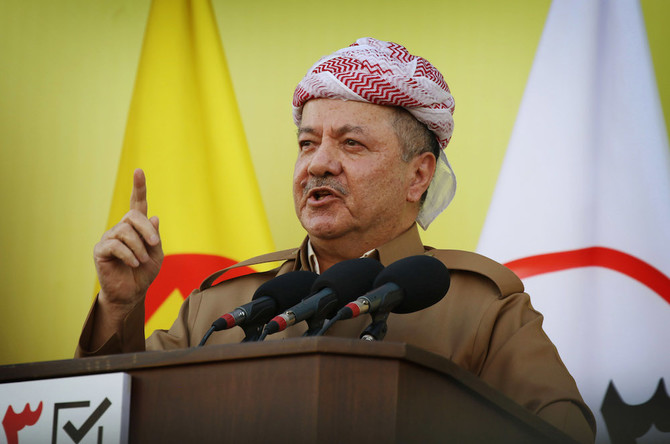BAGHDAD: Iraq’s main Kurdish political forces have failed to agree on a candidate for the post of president, highlighting the depth of the rift between them and redrawing their map of influence in Baghdad, negotiators told Arab News.
Electing the president is the second step in the process of forming a government. According to the political power sharing agreement adopted by Iraqi political parties since the 2003 US-led invasion that toppled Saddam Hussein, the post is allocated to the Kurds.
By the end of Monday, the last day for nominations, more than 30 candidates, including a woman, had declared their nominations for the post but the absence of consensus between the Kurdish parties on a single candidate, meant the vote was delayed until Thursday.
The president in the Iraqi constitution does not have wide executive powers, but could play a pivotal role in resolving disputes between Baghdad and Erbil, the capital of the autonomous Kurdish region, and between the Shiite, Sunni and Kurdish powers in Baghdad.
The Patriotic Union of Kurdistan (PUK) and the Kurdistan Democratic Party (KDP), the largest Kurdish parties in Iraq control more than 50 seats in parliament. The two parties have shared the federal posts allocated to the Kurds for the last 15 years. Voting for the PUK’s presidential candidate had become a tradition, but the insistence of the KDP to compete for the post this time has confused Iraq’s parties and forced them to renegotiate.
“It is time to get this position back to the larger Kurdish bloc,” Irdlan Noor Al-Deen, a KDP leader and MP said. “We are insisting to compete for the post ... and we will not discuss the option of stepping down.”
The failure of the Kurds to agree on a single candidate will threaten the stability of the Kurdish region and deepen the disagreement between the two Kurdish parties that arose in October last year when Kurdish forces associated with the PUK refused to fight Iraqi security forces after they launched a campaign to regain central government control over the disputed areas between Baghdad and Erbil. The offensive was in response to the independence referendum held a month earlier.
The two parties are squaring up in elections scheduled for next week for the Kurdistan Regional Government.
Azad Warti, a PUK leader, said that if the political “fire” from the KDP continued after the elections “we will review our relationship with them.”
“There are a lot of joints areas between us ... and continuing with this approach means that we may not continue with them in the same front,” he said.
Last week, the PUK’s leadership nominated the Kurdish veteran politician Barham Salih, while the KDP nominated Fuad Hussein, the head of the Kurdistan Regional Presidency Office and personal secretary of Massoud Barzani, the most prominent Kurdish leader and former president of the Kurdish region.
It is not clear why Barzani, who headed the KDP, suddenly insisted on the presidential candidacy. Some observers see this step as an attempt to seek revenge against the Kurdish and Shiite forces that rejected the independence referendum and supported Prime Minister Haider Al-Abadi when he imposed a series of financial and administrative sanctions on Kurdistan.
“Barzani is looking to get revenge from the leaders of the PUK because he believes that they let him down in his battle with Baghdad when he held the referendum,” Abdulwahid Tuama, a political analyst told Arab News.
“Also, getting the post for the KDP candidate will reinforce the divisions between the PUK and its Kurdish allies in Baghdad, and this will provide the KDP with a great opportunity to be the touchstone in the ongoing negotiations to form a government in Baghdad.”
The major Shiite blocs, which initially declared their support for Barham Salih, have now said they do not mind if the KDP takes over the president, but stipulated the replacement of the party's official candidate.
“Fouad Hussein was rejected by all Shiite political forces. We told Barzani that we have no objection to voting for his candidate, but he has to nominate someone else,” A key Shiite negotiator told Arab News.
“Hussein is the private secretary of Barzani and if he is elected as president of Iraq, it means that the president will be Barzani’s secretary.
“This is an insult to the country and to all, and we will never accept it.”
Iran and the United States have been the most prominent international players in Iraq since 2003. Both are deeply involved in the ongoing negotiations between Kurdish, Shiite and Sunni parties.
Brett McGurk, the US envoy to Iraq and Syria, has played a key role in naming Barham Salih as a candidate for the PUK, while Gen. Qassim Sulaimani, the commander of Iran’s Quds Force, flew to Erbil on Sunday evening to meet Barzani and “persuade him to abandon his stubbornness and accept a compromise that excludes both candidates (Salih and Hussein),” two Shiite negotiators told Arab News.
“Sulaimani went last night to Erbil to smooth the tension and try to find a solution that would be accepted by all the related parties,” a key Shiite negotiator told Arab News.
“He will suggest to provide a new candidate who should be accepted by all Kurdish, Shiite and Sunni parties.
The negotiator said parliament may vote to reelect Fuad Massum, the outgoing Iraqi president, as he is accepted by all.
















